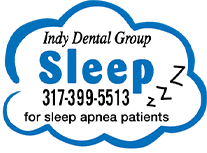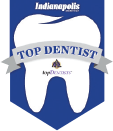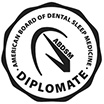Sleep Apnea Treatment – Indianapolis, IN
Stop Snoring, Sleep Comfortably
At Indy Dental Group, we’re focused on two important goals: facilitating easier breathing and ensuring restful nights. In cases of sleep apnea in Indianapolis, when frequent awakenings disrupt your sleep and persistent fatigue becomes a daily struggle, the impact on your overall health and well-being can be significant. This is why our comprehensive sleep apnea treatment is designed to offer essential care, not only alleviating your immediate concerns but also reducing the potential for long-term complications. If you’d like to learn more about our services, continue reading or give us a call today!
What is Sleep Apnea?
Sleep apnea is a prevalent disorder impacting countless individuals across the United States. While it manifests in three distinct forms, the most widespread is obstructive sleep apnea (OSA). This type causes relaxation and subsequent collapse of your throat muscles to occur, leading to airway obstruction. Consequently, proper airflow is hindered, causing you to wake up multiple times during the night.
Given that many patients are unaware of their symptoms, recognizing potential indicators is incredibly important if you suspect sleep apnea. Keep an eye out for the following:
- Frequent awakenings accompanied by gasping for air throughout the night
- Pervasive fatigue that lingers during the day
- Morning headaches
- Forgetfulness
- Mood swings
- Decreased libido
- Loud snoring
The Dangers of Sleep Apnea
Aside from your inability to achieve a full night’s rest, sleep apnea can also have damaging effects on your overall health. Many patients who suffer from OSA admit to experiencing depression and difficulty remembering things as well as extreme drowsiness each day. This can negatively impact not only your personal life, but also your professional work. It can also make it hazardous to drive, as you may be too tired and thus, put yourself and others on the road at risk.
But if sleep apnea is left untreated, these initial symptoms can also be combined with problematic conditions developing throughout the body. Your quality of life can suffer greatly, leading to conditions such as stroke, heart attack, diabetes, high blood pressure, and even pre-term birth for women who are pregnant.
Sleep Apnea Treatment Options
CPAP therapy might be known as a go-to solution for sleep apnea. This method involves a specialized machine that consistently directs air through the patient's airway via a nasal mask. Though proven effective, some patients find this approach too uncomfortable or noisy. That's why we introduce an alternative treatment: oral appliance treatment.
At our practice, Dr. Megan Avery is highly trained in oral appliance therapy and can use impressions and models of your mouth to create custom-fitted “snoreguards” to fit over your unique smile. By repositioning your jaw while you sleep, the appliance effectively maintains an open airway, reducing the likelihood of sleep apnea incidents. For many people, this approach offers a comfortable and convenient avenue to tackle sleep apnea symptoms, allowing them to enjoy peaceful dreams once again.
Sleep Apnea FAQs
Learning how to navigate sleep apnea can be difficult. When discovering that treatment is available for this type of condition, you may wonder if it will work, how long you’ll need to undergo care, and the kind of results you can expect. Asking questions is normal, and our team at Indy Dental Group is here to make sure you receive the necessary answers to help you make the right choice about your overall health. Review the questions listed below and call us if you would like to discuss them further.
Why should I see a dentist for sleep apnea treatment?
Seeing a dentist for sleep apnea treatment might not seem like the right choice, but you may not realize that these oral healthcare professionals have much experience in this area. While a general dentist will need additional training to provide sleep apnea treatment, the fact remains that the upper respiratory area is a common location for dental experts to study.
Because one of the most effective forms of treatment is oral appliance therapy, dentists are used to creating custom mouthguards and nightguards for those who grind and clench their teeth. The ability to provide a similar device to curb sleep apnea symptoms is not a foreign concept. Instead, your dentist in Indianapolis at Indy Dental Group can help to improve your ability to breathe freely at night while reducing the chances of an obstruction.
Can I diagnose sleep apnea on my own?
You may be able to recognize the symptoms of sleep apnea on your own, but you cannot formally diagnose yourself. The reason is that to receive proper treatment, insurance companies will need completed and formal paperwork that justifies the need for an oral appliance. Yes, there are devices available that can help in mapping your sleep patterns and possible issues that may be occurring (i.e., a smartwatch); however, these are not deemed reliable by medical standards.
The only way to receive a formal diagnosis is to undergo a sleep study, which our team will be happy to coordinate for you.
Will my sleep apnea go away if I lose weight?
If a dentist were to say, “Lose 20 pounds and your sleep apnea will go away,” this would be false. There is no guarantee that your inability to achieve adequate rest will suddenly disappear the moment you start shedding pounds. However, it is believed that losing weight can help to improve your symptoms, especially if you have a build-up of fat around your neck.
Obesity and being overweight are both risk factors for sleep apnea. By making a change to improve your overall health, oxygen may be able to flow more freely if excess tissue is reduced. However, you will need to work with your dentist to determine the cause of your sleep apnea and how best to reduce your symptoms.
Can I have oral appliance therapy if I grind my teeth?
If you are concerned about undergoing oral appliance therapy because you are prone to grinding your teeth, do not worry. This unique device can help to reduce the risk of worn-down tooth enamel because it serves as a helpful barrier. Just like a custom nightguard, your oral appliance is built to withstand the pressure your teeth put on it throughout the night.
In fact, your bruxism may be a side effect of your sleep apnea, or vice versa, in which case, you may find that you begin to grind your teeth less as you treat your sleep apnea.




























